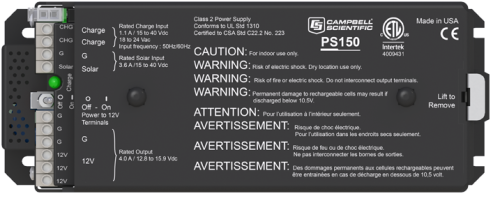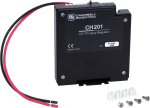






Overview
The 29290 is a 12 Vdc power supply that includes a charging regulator. You can supply the charging power for the 29290 via an unregulated solar panel, ac/ac transformer, or ac/dc converter. The 29290 provides charging with temperature compensation for optimal charging and battery life. A maximum power point tracking algorithm is incorporated for solar inputs to maximize your available solar charging resources.
Read MoreBenefits and Features
- Protects against high-amperage and high-voltage damage to power supply
- Battery reversal protection
- Allows simultaneous connection of two charging sources (e.g., solar panel, ac wall charger)
- ETL listed Class 2 power supply
Images







Technical Description
The 29290 is a micro-controller-based smart charger with temperature compensation that optimizes battery charging and increases the battery's life. Two input terminals enable simultaneous connection of two charging sources. They also incorporate a maximum power point tracking algorithm for solar inputs that maximizes available solar charging resources.
The 29290 has several safety features intended to protect the charging source, battery, charger, and load devices. Battery-reversal protection is included, as well as ESD and surge protection on all of the 29290 inputs and outputs.
Compatibility
Please note: The following shows notable compatibility information. It is not a comprehensive list of all compatible products.
Dataloggers
| Product | Compatible | Note |
|---|---|---|
| 21X (retired) | ||
| CR10 (retired) | ||
| CR1000 (retired) | ||
| CR10X (retired) | ||
| CR200X (retired) | ||
| CR211X (retired) | ||
| CR216X (retired) | ||
| CR23X (retired) | Typically, a CR23X datalogger uses its integrated rechargeable base instead of the 29290. However, the 29290 can be used if the data logger has a low-profile base or if the battery base has been disconnected. | |
| CR3000 (retired) | Typically, a CR3000 datalogger uses its integrated rechargeable base instead of the 29290. However, the 29290 can be used if the data logger has a low-profile base or if the battery base has been disconnected. | |
| CR500 (retired) | ||
| CR5000 (retired) | Typically, a CR5000 datalogger uses its integrated rechargeable base instead of the 29290. However, the 29290 can be used if the data logger has a low-profile base or if the battery base has been disconnected. | |
| CR510 (retired) | ||
| CR6 | ||
| CR800 (retired) | ||
| CR800 (retired) | ||
| CR850 (retired) | ||
| CR850 (retired) | ||
| CR850 (retired) | ||
| CR850 (retired) | ||
| CR9000 (retired) | ||
| CR9000X (retired) |
Additional Compatibility Information
Enclosure Considerations
A desiccated, non-condensing environment is required. The 29290 includes built-in keyhole flanges for mounting to the backplate of a Campbell Scientific enclosure.
Adapters
The 29290 is compatible with the A100 null-modem adapter and the A105 adapter for additional 12 V output terminals. The A100 Null Modem Adapter connects and powers two Campbell Scientific peripherals via two CS I/O 9-pin connectors configured as a null modem. This is useful in linking different communications technologies, such as telephone to radio, at sites that do not have a data logger. The A105 adapter may be used to provide additional 12 V and ground terminals where the power supply is used to power several devices.
Specifications
| Operational Temperature | -40° to +60°C (VRLA battery manufacturers state that “heat kills batteries” and recommend operating batteries at ≤ 50°C.) |
| Dimensions | 19.3 x 7.6 x 10.6 cm (7.5 x 3 x 4.2 in.) |
CHARGE - CHARGE Terminals (AC or DC Source) |
|
| AC | 18 to 24 V RMS (internally limited to 1.2 A RMS) |
| DC | 16 to 40 Vdc (internally limited to 1.2 Adc) |
SOLAR Terminals (Solar Panel or Other DC Source) |
|
| -NOTE- | Battery voltages below 8.7 V may result in < 3.0 A current limit because of fold-back current limit. |
| Input Voltage Range | 15 to 40 Vdc |
| Maximum Charging Current | 4.0 Adc typical (3.2 to 4.9 Adc depending on individual charger) |
Quiescent Current |
|
| No Charge Source Present | 160 μA at 13.7 Vdc |
| No Battery Connected | 930 μA at 30 V input voltage (ac or dc) |
Battery Charging |
|
| -NOTE- | The "T" represents temperature in degrees Celsius. |
| FLOAT Charging | Vbatt(T) = 13.65 - (24 mV) x (T - 25) + (0.24 mV) x (T - 25)2 |
| Accuracy | ±1% (on charging voltage over -40° to +60°C) |
Power Out (+12 Terminals) |
|
| Voltage | Unregulated 12 V from battery (4.65 A solid-state circuit breaker) |
| Standards | ETL Listed Class 2 power supply |



